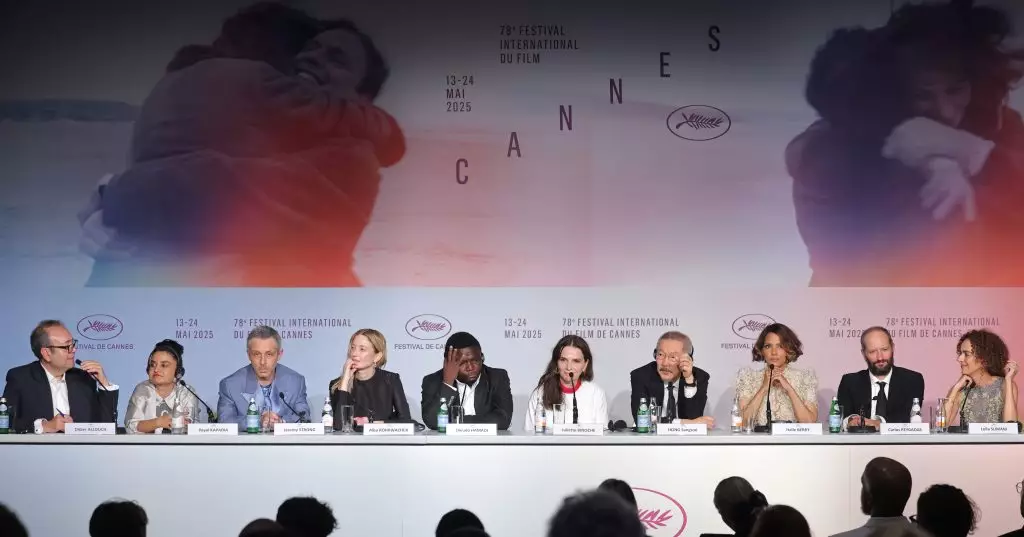The prestigious Cannes Film Festival is often seen as a bastion for artistic excellence, and this year, it solidified its reputation with an unexpected yet much-deserved victory: Jafar Panahi’s “It Was Just an Accident” clinched the coveted Palme d’Or. This outcome not only surprised many but also sent a resounding message about the power of film as a tool for resistance and reflection in tumultuous times. Jury President Juliette Binoche aptly described the film as stemming from “a feeling of resistance, survival, which is absolutely necessary today,” encapsulating its essence as both a personal and political narrative.
Panahi’s journey in cinema has been nothing short of remarkable. Not only is he a celebrated filmmaker recognized on international platforms, but he is also a figure who has faced considerable adversity—specifically, multiple imprisonments in Iran for his outspoken views on the oppressive regimes dictating his homeland. Therefore, his win at Cannes serves not just as an accolade for his craft but as a broader social commentary on the role of art during times of distress, reinforcing the idea that creativity can flourish even in dire conditions.
The Human Connection Behind the Lens
Panahi’s latest feature dives deep into the lives of working-class individuals wrongfully accused and strives to find a form of justice in a world dominated by cruelty. The film serves as a critical mirror reflecting the prevailing mindset of society, particularly in how we respond to grievances and injustices. Binoche passionately remarked, “Art will always win. What is human will always win.” This sentiment speaks volumes in a world often overshadowed by violence and retribution. It challenges viewers and creators alike to engage in dialogue rather than conflict, emphasizing the transformative power of art.
The film’s narrative showcases not revenge but the possibility of forgiveness and understanding, suggesting a profound shift in how society handles grievances. As Binoche articulated, “The fact that one can talk about this change within the film, this idea you can listen and not necessarily want to kill someone or rough them up, holds out huge hope.” This outlook aligns with the necessity of re-evaluating how we as humans relate to one another, especially in a world that often feels engulfed in darkness.
The Art of Escaping the Mud
In a press conference brimming with insights, jury member J.A. Strong reflected on the broader significance of the selection process. With a touch of humor, he equated their discussions to “a conclave with champagne,” but both he and Binoche stressed the serious, underlying themes that guided their decisions. The choice to award “It Was Just an Accident” the Palme d’Or and “Sentimental Value” the Jury Prize signals a commitment to recognizing art that transcends mere storytelling; these films embody a form of resilience that is crucial in today’s fractured narrative landscape.
Their remarks draw attention to cinema’s role as a medium capable of fostering dialogues that can alter perceptions. “It’s important for us,” Strong noted, “we wanted to recognize films that were transcendent as intrinsically as they were pieces of work.” This understanding that film can generate an emotional and cognitive shift adds layers to its importance—it is not just artistic expression, but a chance to tackle the pressing issues of our time.
Charting New Paradigms in Storytelling
Through the lens of Panahi’s film, we see a remarkable invitation to contemplate our collective responsibility in shaping a better, more humane society. The notion that a paradigm shift is necessary to pull ourselves from the “mud of violence,” as Binoche articulated, resonates deeply. It challenges filmmakers and audiences alike to engage with stories that inspire hope rather than despair, compassion over animosity.
As discussions surrounding the film industry continue to evolve, “It Was Just an Accident” stands as a crucial reminder of the profound impact that narratives can have in surmounting the challenges we face. Art can serve as a salve to the wounds of our society, prompting a long-overdue reflection on our shared humanity and our potential for change. As we watch these cinematic works unfold, it becomes increasingly evident that they hold the key to unlocking not only our understanding of complex issues but also our capacity for empathy and growth in a world that desperately needs it.
